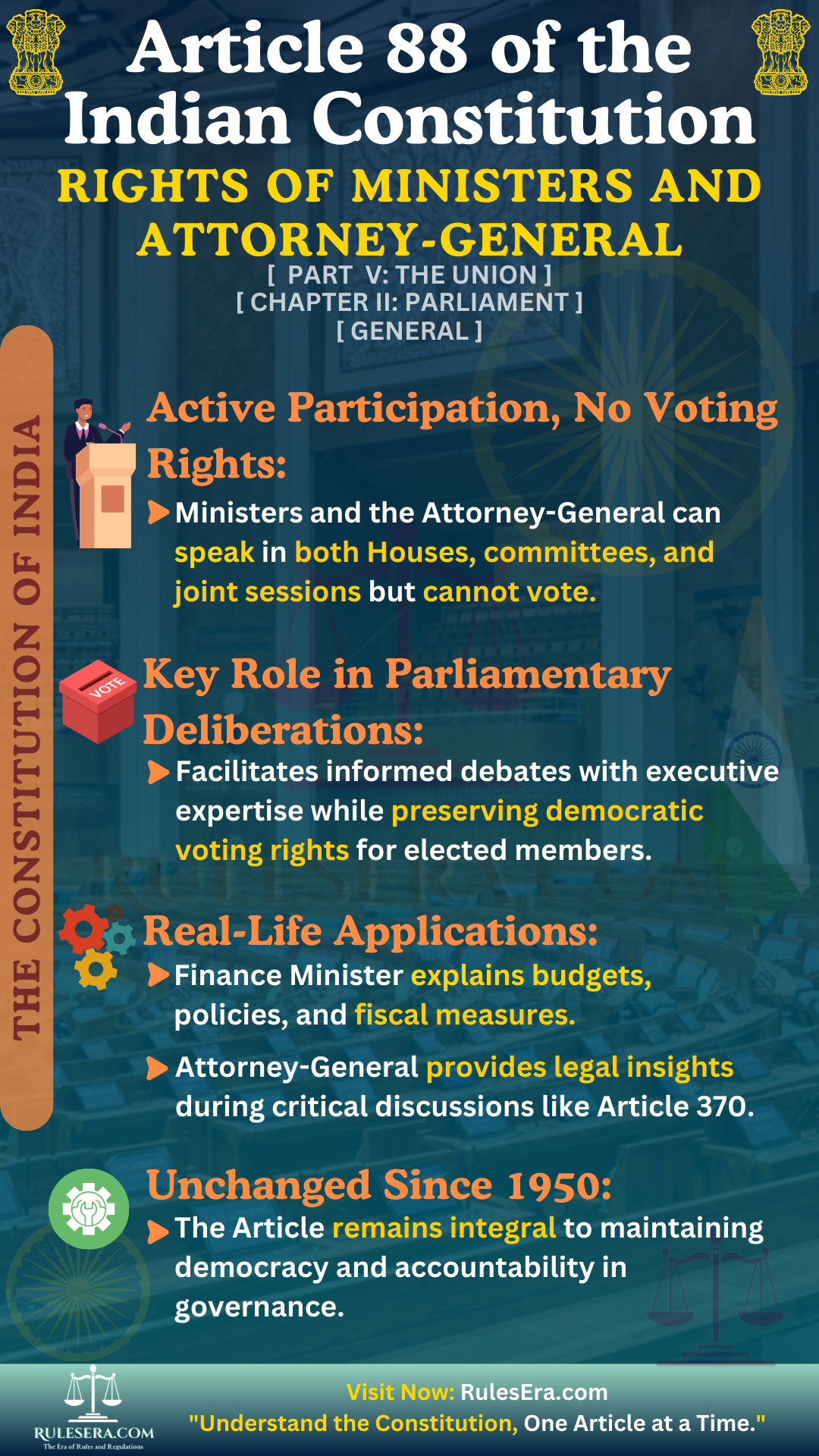Part V: The Union
Chapter II: Parliament
Article 88: Rights of Ministers and Attorney-General as respects Houses

--- Original Article ---
Every Minister and the Attorney-General of India shall have the right to speak in, and otherwise to take part in the proceedings of, either House, any joint sitting of the Houses, and any committee of Parliament of which he may be named a member, but shall not by virtue of this article be entitled to vote.
Explanation
Article 88 provides the foundation for the active participation of the executive branch in parliamentary proceedings. This provision permits all Ministers and the Attorney-General to engage directly with Members of Parliament, facilitating a robust dialogue on governance matters. However, the Article restricts them from voting, maintaining a clear division between advisory roles and legislative decision-making.
Key Provisions of Article 88
Participation in Parliamentary Proceedings
Article 88 authorizes Ministers and the Attorney-General to take part in both Houses of Parliament, as well as in any joint sessions or parliamentary committee meetings of which they are members. This right is instrumental in ensuring that legislative deliberations benefit from the insights and expertise of those responsible for implementing laws and overseeing legal interpretations.
Exclusion of Voting Rights
While Ministers and the Attorney-General can contribute by speaking and participating, they are not entitled to vote on matters within Parliament. This provision upholds the principle that legislative voting is a privilege of elected representatives, safeguarding democratic accountability and preventing conflicts of interest.
Amendments and Legislative Developments
The Article has not been amended since the adoption of the Constitution in 1950. This stability underscores the Article’s alignment with the constitutional vision of an informed yet non-voting participation by the executive in Parliament.
Real-Life Example
During budget discussions, the Finance Minister often explains fiscal policies and clarifies economic measures. In these sessions, the Finance Minister presents the budget and addresses members’ queries, but the voting on budget allocations is exclusively undertaken by Members of Parliament. This setup illustrates the distinction between executive advisement and legislative decision-making preserved by Article 88.
In a 2020 parliamentary session, the Attorney-General addressed members on constitutional issues surrounding the abrogation of Article 370. While he provided critical insights, his role was limited to speaking and advising, with no capacity to vote on the related bills. This example illustrates the purpose of Article 88: to leverage expertise without influencing decisions through voting.
Historical Context and Rationale
The drafting of Article 88 reflects the framers' intent to bring executive insight directly into parliamentary discussions, especially on issues requiring technical or legal input. The Attorney-General’s role, in particular, ensures that Parliament benefits from independent legal perspectives, aligning with democratic values of transparency and accountability. This provision is consistent with parliamentary systems worldwide, where non-elected officials may advise but do not vote, preserving the integrity of legislative processes.
References
- Constituent Assembly Debates, December 1948
- Pylee, M.V., India's Constitution
- Ministry of Law and Justice, Handbook on the Constitution of India
- Basu, D.D., Commentary on the Constitution of India
- Constituent Assembly Debates, Vol. IX
- Subhash C. Kashyap, Our Parliament: An Introduction to the Parliament of India
Legislative History
Article 88 of the Indian Constitution, originally proposed as Article 72 in the Draft Constitution, was formally adopted into the Indian Constitution on May 18, 1949.
Debates and Amendments
In the Constituent Assembly sessions, Prof. K. T. Shah proposed that only elected Members of Parliament who serve as Ministers or the Attorney-General of India should have the right to speak and participate in parliamentary proceedings. He emphasized the importance of ensuring ministers are accountable directly to Parliament, advocating for elected members to have both speaking and voting rights.
Shri H. V. Kamath opposed Prof. K.T. Shah's amendment, asserting that the current provision in Article 72 explicitly permits Ministers and the Attorney-General to participate in debates without voting rights. Kamath argued that Shah's amendment introduces confusion regarding the eligibility for voting, particularly by suggesting that even elected members such as Ministers or the Attorney-General should be excluded from voting. He emphasized that the existing article effectively differentiates between nominated and elected members, safeguarding the voting rights of elected representatives.
Mr. Tajamul Hussain opposed Prof. K.T. Shah's amendment, arguing that requiring the Attorney-General of India to be an elected member of Parliament is impractical because it does not ensure the individual is a qualified lawyer. He highlighted that Article 63 permits the President to appoint the Attorney-General from Supreme Court Judges, making Shah's amendment redundant and illogical.
At last, Dr. B. R. Ambedkar argued that Article 72 allowed Ministers from one House to participate in proceedings of the other House, essential for handling bills requiring approval from both chambers. He emphasized that while Ministers could participate, voting rights were limited to elected members, preserving each House's autonomy. Ambedkar opposed replacing 'Minister' with 'elected person' in the article, citing potential complications with constitutional provisions allowing non-elected individuals to serve as Ministers temporarily.
Therefore, Professor K. T. Shah's proposed amendment was rejected, and the original draft, as articulated by Dr. B. R. Ambedkar, was incorporated into the Indian Constitution.
Frequently Asked Questions (FAQs):
No, Ministers and the Attorney-General can participate in discussions but do not have voting rights in Parliament, as per Article 88.
The Attorney-General of India can speak and participate in discussions within both Houses and parliamentary committees but cannot vote on legislative matters.